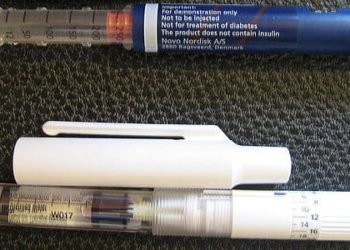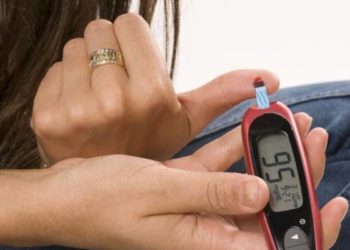Patient Basics: Hypoglycemia
Originally published by Harvard Health.
What Is It?
Hypoglycemia is an abnormally low level of blood sugar (blood glucose). Because the brain depends on blood sugar as its primary source of energy, hypoglycemia interferes with the brain’s ability to function properly. This can cause dizziness, headache, blurred vision, difficulty concentrating and other neurological symptoms. Hypoglycemia also triggers the release of body hormones, such as epinephrine and norepinephrine. Your brain relies on these hormones to raise blood sugar levels. The release of these hormones causes additional symptoms of tremor, sweating, rapid heartbeat, anxiety and hunger.
Hypoglycemia is most common in people with diabetes. For a person with diabetes, hypoglycemia occurs because of too high a dose of diabetic medication, especially insulin, or a change in diet or exercise. Insulin and exercise both lower blood sugar and food raises it. Hypoglycemia is common in people who are taking insulin or oral medications that lower blood glucose, especially drugs in the sulfonylurea group (Glyburide and others).
True hypoglycemia with laboratory reports of low blood sugar rarely occurs in people who do not have diabetes. When it does occur outside of diabetes, hypoglycemia can be caused by many different medical problems. A partial list includes:
- Gastrointestinal surgery, usually involving removal of some part of the stomach. Surgery that removes part of the stomach can alter the normal relationships between digestion and insulin release. “Nissen” surgeries for treatment of gastroesophageal reflux can also result in episodes of hypoglycemia.
- The antibiotics gatifloxacin (Tequin, which was recently removed from the market in the U.S.), levofloxacin (Levaquin), and related drugs
- A pancreatic tumor, called an insulinoma, that secretes insulin
- A deficiency of growth hormone from the pituitary gland or of cortisol from the adrenal glands. Both of these hormones help to keep blood sugars normal
- Alcohol
- Overdose of aspirin
- Severe liver disease
- Use of insulin by someone who does not have diabetes
- Cancers, such as cancer of the liver
- Rarely, an enzyme defect. Examples of enzymes that help keep blood sugar normal are glucose-6-phosphatase, liver phosphorylase, and pyruvate carboxylase,
Symptoms
Hypoglycemia can cause:
- Symptoms related to the brain “starving” for sugar — Headache, dizziness, blurred vision, difficulty concentrating, poor coordination, confusion, weakness or fainting, tingling sensations in the lips or hands, confused speech, abnormal behavior, convulsions, loss of consciousness, coma
- Symptoms related to the release of epinephrine and norepinephrine — Sweating, tremors (feeling shaky), rapid heartbeat, anxiety, hunger
Diagnosis
If a person with diabetes has severe hypoglycemia, he or she may not be able to answer the doctor’s questions because of confusion or unconsciousness. In this case, a family member or close friend will need to describe the patient’s medical history and insulin regimen. To help ensure effective emergency treatment, all people with diabetes should consider wearing a medical alert bracelet or necklace. This potentially lifesaving jewelry will identify the patient as having diabetes, even if the patient is far from home and traveling alone. Family members or friends of a person with diabetes should learn how to bring a patient out of severe hypoglycemia by giving the person orange juice or another carbohydrate, or by giving an injection of the drug glucagon, which can raise blood sugar.
If a person with diabetes can answer questions appropriately, the doctor will ask about his or her current insulin dosage, as well as recent food intake, exercise schedule and other medications. If the patient has been self-monitoring blood sugar with a glucometer (a hand-held device to measure glucose levels in blood from a finger prick), the doctor will review the most recent glucometer readings to confirm low blood sugar and to check for a pattern of hypoglycemia related to diet or exercise.
In people who do not have diabetes, the doctor will review current medications and ask about any history of gastrointestinal surgery (especially involving the stomach), liver disease and an enzyme deficit. Patients should describe their symptoms and when the symptoms occur — whether they occur before or after meals, during sleeping or after exercise.
In a person with diabetes, the diagnosis of hypoglycemia is based on symptoms and blood sugar readings. In most cases, no further testing is necessary.
In a person who is not diabetic, the ideal time for diagnostic testing is during an episode of symptoms. At that time, blood can be drawn to measure levels of glucose, and the patient’s reactions to glucose intake can be tested. If these measures confirm the diagnosis of hypoglycemia, blood can be sent to a laboratory to measure insulin levels. If the patient has no symptoms at the time of evaluation, the doctor may ask him or her to measure his or her blood glucose when hypoglycemic symptoms occur. In non-diabetics, a blood sample can be tested to measure liver function and cortisol levels. If an insulinoma is suspected, the doctor may order a supervised 48-hour fast. During that period, blood levels of glucose and insulin will be measured whenever symptoms occur or once every six hours, whichever comes first. A blood glucose level of less than 40 milligrams per deciliter with a high level of insulin strongly suggests the person has an insulinoma or has given himself or herself an insulin injection.
If a person develops symptoms of hypoglycemia only after eating, the doctor may ask him or her to self-monitor blood sugar with a glucometer at the time the symptoms occur.
Expected Duration
An episode of hypoglycemia caused by exercise or by too much short-acting insulin usually can be stopped within minutes by eating or drinking a food or beverage that contains sugar (sugar tablets, candy, orange juice, non-diet soda). Hypoglycemia caused by sulfonylurea or long-acting insulin can take one to two days to go away.
People with diabetes remain at risk for episodes of hypoglycemia throughout life because they need medications that lower blood sugar. Hypoglycemic episodes at night are particularly dangerous because the person often sleeps through part of the time that their blood sugar is low, treating the sugar level less quickly. Over time, repeated episodes can lead to impaired brain function.
About 85% of patients with an insulinoma will be cured of hypoglycemia once the insulin-secreting tumor is removed.
Many people without diabetes who have symptoms that seem like signs of low blood sugar do not truly have low sugar levels. Instead, the symptoms are caused by something other than low blood glucose.
Prevention
In people taking insulin, drinking alcohol can lead to an episode of hypoglycemia. Patients with diabetes should discuss with their doctors how much alcohol, if any, they can drink safely. Alcohol can cause serious episodes of hypoglycemia even when insulin was taken hours before. People with diabetes should be very aware of this possible problem if they drink.
People with diabetes should always have ready access to emergency supplies for treating unexpected episodes of hypoglycemia. These supplies may include candy, sugar tablets, sugar paste in a tube and/or a glucagon injection kit. A glucagon injection may be given by a knowledgeable family member or friend if a hypoglycemic patient is unconscious and cannot take sugar by mouth. For diabetic children, emergency supplies can be kept in the school nurse’s office.
Any person at risk of hypoglycemic episodes can help to avoid delays in treating attacks by learning about his or her condition and sharing this knowledge with friends and family members. The risk for hypoglycemia is lower if you eat at regular times during the day, never skip meals and maintain a consistent exercise level. Like people with diabetes, nondiabetic people with hypoglycemia should always have ready access to a source of sugar. In rare circumstances, a doctor may prescribe a glucagon emergency kit for nondiabetic people who have a history of becoming disoriented or losing consciousness from hypoglycemia.
Treatment
If a conscious person is having symptoms of hypoglycemia, the symptoms usually go away if the person eats or drinks something sweet (sugar tablets, candy, juice, non-diet soda). An unconscious patient can be treated with an immediate injection of glucagon or with intravenous glucose infusions in a hospital.
People with diabetes who have hypoglycemic episodes may need to adjust their insulin dose or change their diet or exercise habits.
Even if you recognize that your symptoms are caused by hypoglycemia, you should treat yourself or seek treatment, and not try to just “tough it out.” People with long-standing diabetes may stop experiencing the usual early warning symptoms of hypoglycemia. This is called hypoglycemic unawareness, and it can be very serious because the person may not know to seek treatment. If you and your doctor identify that you are unaware when you have low blood sugars, your dose of insulin probably will need to be reduced. You probably will need to check your blood sugar more often. You may need your insulin dose adjusted frequently to maintain reasonable blood sugars (but not “perfect” sugars) with less risk of hypoglycemia.
An insulinoma is treated with surgery to remove the tumor. Hypoglycemia caused by problems with the adrenal or pituitary glands is treated by replacing the missing hormones with medication. Nondiabetic people with hypoglycemic symptoms following meals are treated by modifying their diet. They usually need to eat frequent, small meals and avoid fasting.
When To Call A Professional
Call for emergency medical assistance whenever anyone is unconscious or obviously disoriented. Severe insulin reactions can be fatal, so it is important to seek treatment immediately.
People with diabetes should contact their doctors promptly if they experience frequent episodes of hypoglycemia. They may need to adjust their daily doses of insulin, oral hypoglycemic medication or their meal plans.
If you have diabetes and you develop one or more low blood sugars during a time when you are being treated with the antibiotic ciprofloxacin (Cipro), levofloxacin (Levaquin) or gatifloxacin (Tequin), do not take any additional doses of the medication until you are able to discuss the problem with your doctor.
Nondiabetic people who experience symptoms of hypoglycemia should contact their doctors for evaluation of the problem.
Prognosis
In people with diabetes, the outlook is excellent if they follow their prescribed insulin dosage, recommended diet and exercise guidelines.
Most patients with insulinomas can have them removed successfully by surgery. However, in about 15% of these patients, the insulinoma is cancerous and has spread, so it cannot be removed completely. These patients may still suffer from hypoglycemia after surgery.
Most patients with other forms of hypoglycemia can be treated successfully with changes in diet.
Additional Info
National Institute of Diabetes & Digestive & Kidney Disorders
Office of Communications and Public Liaison
Building 31, Room 9A04
31 Center Drive, MSC 2560
Bethesda, MD 20892-2560
Phone: (301) 496-4000
http://www.niddk.nih.gov/
American Diabetes Association
ATTN: National Call Center
1701 N. Beauregard St.
Alexandria, VA 22311
Toll-Free: (800) 342-2383
http://www.diabetes.org/



